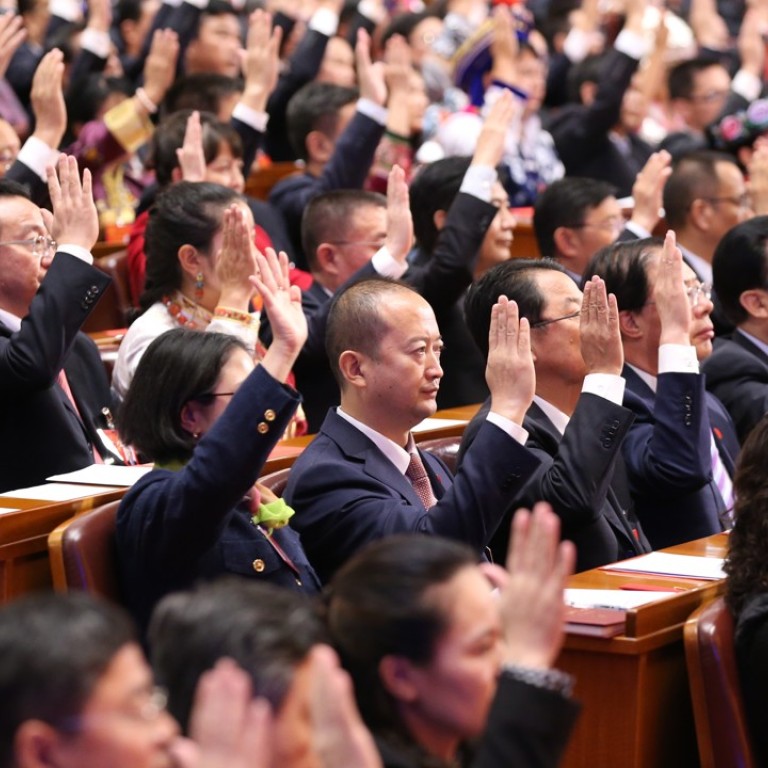
Three disgraced Chinese Communist Party officials accused of trying to rig elections
Allegations led to party abandoning usual vote-based promotion system at 19th national congress
Three disgraced senior officials from China’s Communist Party, including a man once considered a possible successor to President Xi Jinping, have been accused of rigging internal elections, as the party revealed on Thursday it abandoned a vote-based promotion system at its latest leadership reshuffle.
The accused cadres are the former security tsar Zhou Yongkang, former chief of staff to President Hu Jintao Ling Jihua, and former Chongqing party boss Sun Zhengcai, according to a Xinhua report.
Sun, who became the subject of an official investigation in July, was the youngest member of the Politburo and considered a front runner to succeed Xi. The party has yet to announce what charges he is facing.
Xinhua published a lengthy article revealing some of details of how candidates for top party roles were selected. It also accused the three leaders of bribing voters in internal elections.
It said that vote rigging occurred at both the 17th and 18th party congresses in 2007 and 2012, but did not specify which elections the trio are accused of trying to manipulate.
At the congress that ended on Tuesday, the party revoked a vote-based recommendation system to choose its top leadership, opting instead for a “consultation” mechanism.
“The 17th and 18th party congresses adopted recommendations during meetings, but the weight of those votes was overemphasised,” according to the Xinhua article, which detailed how members of the innermost Politburo Standing Committee and the broader Politburo were selected.
“Some comrades did nothing beyond putting a tick on the ballot, leading to arbitrary voting and a distortion of public opinion,” it said.
Such elections were susceptible to the influence of guanxi, or personal networks, which often led to cronyism, it said.
The statement was a rare criticism of the vote-based recommendation system, which the party adopted at the 17th and 18th congresses, and which it claimed was “underlining the party’s determination [to achieve] internal democracy”.
Under that system, full and alternative members of the Central Committee at the 17th congress voted to select their favourite 25 cadres – for the Politburo – from a list of 200 candidates. Five years later, the system was used to select both the members of the Politburo and its elite Standing Committee.
Those methods were largely overhauled this year. Although cadres were still allowed to vote, recommendations were mainly based on face-to-face consultations, the article said.
President Xi had consultations with 57 cadres, while other top party leaders met 201 cadres to hear their recommendations.
The report did not say who was approached or how they were chosen.
The cadres also agreed to a more flexible appointment system that could oust incumbent Politburo members even before the unofficial retirement age of 68, the article said.
The clarification came after three Politburo members – all younger than the unofficial retirement age – lost their Politburo places at the latest congress, though there have been no reports thus far of them being placed under investigation.
Another piece by Xinhua earlier this week explained how the 204 full members and 172 alternative members of the Central Committee were selected.
Whoever did not toe the party line or commit to the central leadership, was immediately deemed out of the running, it said.
The alleged rigging of internal elections was a result of the lack of transparency and fair competition, Shanghai-based political scientist Chen Daoyin said.
“These attempts at in-party democracy are secretive and non-competitive, so candidates can’t campaign openly,” he said.
“So these elections, stopping short of learning from the bright side of Western democracy, have picked up everything from the dark side.”
Chen pointed to the large-scale vote-buying scandals in the provincial parliaments of Hunan and Liaoning, which combined saw the disqualification of more than 1,000 lawmakers and dozens of members of the National People’s Congress.
“That’s like giving up eating for fear of choking,” he said.
“There are flaws in such voting but it constrains the arbitrary rule of those in power … now personnel appointments will be increasingly dependent on the wills of those in power.”

